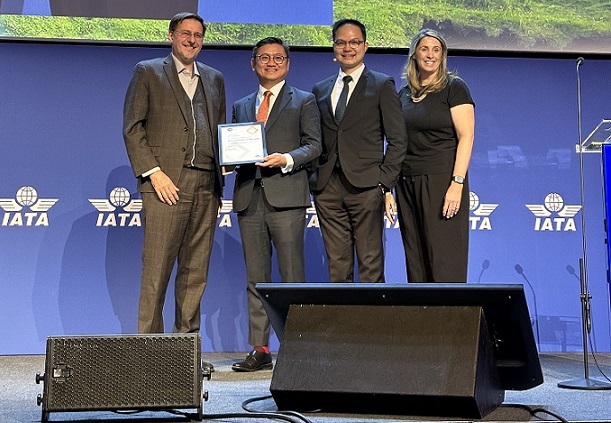IATA launches programme to support ground technologies
08 / 05 / 2024

IATA’s director of ground operations presenting certificate to HACTL. Photo: IATA
The International Air Transport Association (IATA) aims to accelerate the introduction of enhanced ground support equipment (GSE) technologies into daily operations with a new programme.
Presented at IATA’s Ground Handling Conference (IGHC) this week, the IATA Enhanced GSE Recognition Program recognises Ground Handling Service Providers (GHSPs) that are modernising their vehicle fleets.
The programme encourages the installation of anti-collision systems on new and existing ground support equipment (GSE), to prevent expensive potential damage to aircraft on the ramp.
The first ground handlers to obtain this recognition at various stations are HACTL and Menzies Aviation.
GHSPs participating in the programme will have the opportunity for their fleets to be assessed. Those achieving a ratio of Enhanced GSE to non-Enhanced GSE that exceeds a predetermined threshold will receive a recognition stamp valid for two years.
Participation in the programme will be voluntary and free of charge, as part of IATA’s commitment to achieving industry-wide safety improvements without imposing financial burdens on GHSPs.
IATA estimates that the annual cost of ground damage to aircraft could reach $10bn by 2035 unless preventive action is taken. However, transitioning 75% of the global fleet of belt-loaders, cargo-loaders, passenger stairs and passenger boarding bridges to Enhanced GSE, would reduce the current expected ground damage cost per turn rate by 42%.
The IATA Airport Handling Manual (AHM) already advises on the design and use of Enhanced GSE as a best practice. The programme will serve as an add-on to the IATA Safety Audit for Ground Operations (ISAGO), which will include the integration of Enhanced GSE into operations as of 2025.
The programme will be deployed in several phases, initially focusing on assessing the three types of GSE most associated with ground damage incidents: belt loaders, ULD loaders, and passenger stairs. Over time, it will expand to include lifting and elevating GSE that docks at aircraft doors and GSE that couples to aircraft.
The programme is the latest action to facilitate the transition to Enhanced GSE. It follows the publication in late 2022 of the IATA Ground Damage Report: The Case for Enhanced Ground Support Equipment which identified safety and sustainability benefits that could be gained from this transition.
Enhanced GSE uses anti-collision and inching technology, which improves vehicle control, and increases docking accuracy. Additionally, most Enhanced GSE is electrically powered, thereby delivering sustainability gains over most non-Enhanced GSE.
“The Enhanced GSE Recognition Programme is another pillar of IATA’s efforts to reduce ground damage by transitioning to Enhanced GSE fleets. The transition has been slow, despite well-documented gains in safety, cost-reduction and sustainability. By recognizing those companies leading the evolution, we aim to accelerate this critical industry transition,” said Monika Mejstrikova, IATA’s director of ground operations.
Hactl began installing anti-collision equipment to its GSE fleet in 2017. Its collision avoidance systems trigger an audio-visual alert to operators when GSE is within close proximity to aircraft.
Hactl executive director – operations, Paul Cheng, said: “Hactl is totally committed to all measures that improve ramp safety, and has once again leveraged technology to protect its customers’ valuable assets.
“We are proud to be the first ground handler in Asia to achieve this distinction, and applaud IATA’s constant efforts in once again driving the adoption of best practice across the entire global aviation industry.”
IATA reports on latest progress made on lowering carbon emissions














